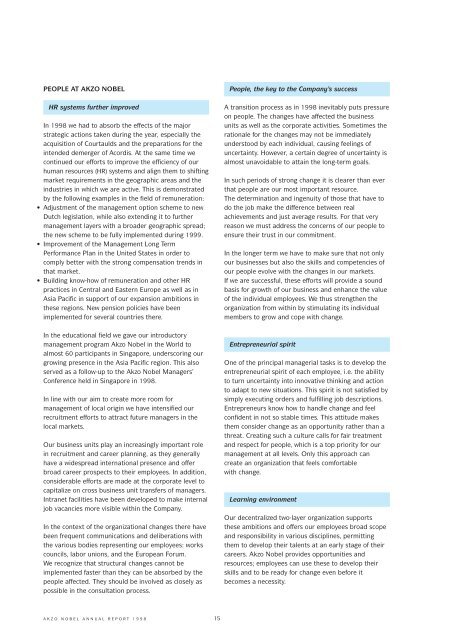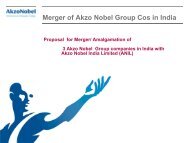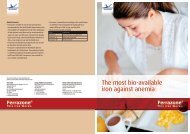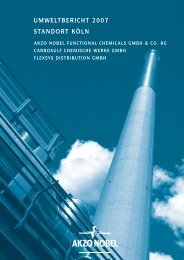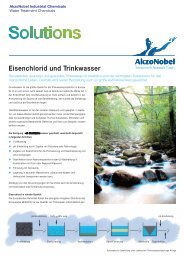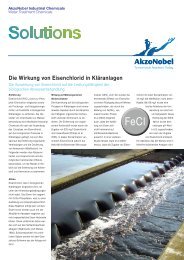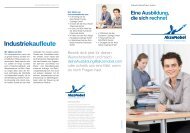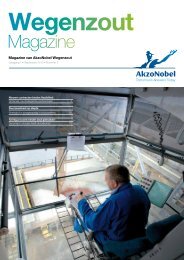Create successful ePaper yourself
Turn your PDF publications into a flip-book with our unique Google optimized e-Paper software.
PEOPLE AT AKZO NOBEL<br />
HR systems further improved<br />
In 1998 we had to absorb the effects of the major<br />
strategic actions taken during the year, especially the<br />
acquisition of Courtaulds and the preparations for the<br />
intended demerger of Acordis. At the same time we<br />
continued our efforts to improve the efficiency of our<br />
human resources (HR) systems and align them to shifting<br />
market requirements in the geographic areas and the<br />
industries in which we are active. This is demonstrated<br />
by the following examples in the field of remuneration:<br />
• Adjustment of the management option scheme to new<br />
Dutch legislation, while also extending it to further<br />
management layers with a broader geographic spread;<br />
the new scheme to be fully implemented during 1999.<br />
• Improvement of the Management Long Term<br />
Performance Plan in the United States in order to<br />
comply better with the strong compensation trends in<br />
that market.<br />
• Building know-how of remuneration and other HR<br />
practices in Central and Eastern Europe as well as in<br />
Asia Pacific in support of our expansion ambitions in<br />
these regions. New pension policies have been<br />
implemented for several countries there.<br />
In the educational field we gave our introductory<br />
management program Akzo Nobel in the World to<br />
almost 60 participants in Singapore, underscoring our<br />
growing presence in the Asia Pacific region. This also<br />
served as a follow-up to the Akzo Nobel Managers’<br />
Conference held in Singapore in 1998.<br />
In line with our aim to create more room for<br />
management of local origin we have intensified our<br />
recruitment efforts to attract future managers in the<br />
local markets.<br />
Our business units play an increasingly important role<br />
in recruitment and career planning, as they generally<br />
have a widespread international presence and offer<br />
broad career prospects to their employees. In addition,<br />
considerable efforts are made at the corporate level to<br />
capitalize on cross business unit transfers of managers.<br />
Intranet facilities have been developed to make internal<br />
job vacancies more visible within the Company.<br />
In the context of the organizational changes there have<br />
been frequent communications and deliberations with<br />
the various bodies representing our employees: works<br />
councils, labor unions, and the European Forum.<br />
We recognize that structural changes cannot be<br />
implemented faster than they can be absorbed by the<br />
people affected. They should be involved as closely as<br />
possible in the consultation process.<br />
AKZO NOBEL ANNUAL REPORT 1998<br />
15<br />
People, the key to the Company’s success<br />
A transition process as in 1998 inevitably puts pressure<br />
on people. The changes have affected the business<br />
units as well as the corporate activities. Sometimes the<br />
rationale for the changes may not be immediately<br />
understood by each individual, causing feelings of<br />
uncertainty. However, a certain degree of uncertainty is<br />
almost unavoidable to attain the long-term goals.<br />
In such periods of strong change it is clearer than ever<br />
that people are our most important resource.<br />
The determination and ingenuity of those that have to<br />
do the job make the difference between real<br />
achievements and just average results. For that very<br />
reason we must address the concerns of our people to<br />
ensure their trust in our commitment.<br />
In the longer term we have to make sure that not only<br />
our businesses but also the skills and competencies of<br />
our people evolve with the changes in our markets.<br />
If we are successful, these efforts will provide a sound<br />
basis for growth of our business and enhance the value<br />
of the individual employees. We thus strengthen the<br />
organization from within by stimulating its individual<br />
members to grow and cope with change.<br />
Entrepreneurial spirit<br />
One of the principal managerial tasks is to develop the<br />
entrepreneurial spirit of each employee, i.e. the ability<br />
to turn uncertainty into innovative thinking and action<br />
to adapt to new situations. This spirit is not satisfied by<br />
simply executing orders and fulfilling job descriptions.<br />
Entrepreneurs know how to handle change and feel<br />
confident in not so stable times. This attitude makes<br />
them consider change as an opportunity rather than a<br />
threat. Creating such a culture calls for fair treatment<br />
and respect for people, which is a top priority for our<br />
management at all levels. Only this approach can<br />
create an organization that feels comfortable<br />
with change.<br />
Learning environment<br />
Our decentralized two-layer organization supports<br />
these ambitions and offers our employees broad scope<br />
and responsibility in various disciplines, permitting<br />
them to develop their talents at an early stage of their<br />
careers. Akzo Nobel provides opportunities and<br />
resources; employees can use these to develop their<br />
skills and to be ready for change even before it<br />
becomes a necessity.


